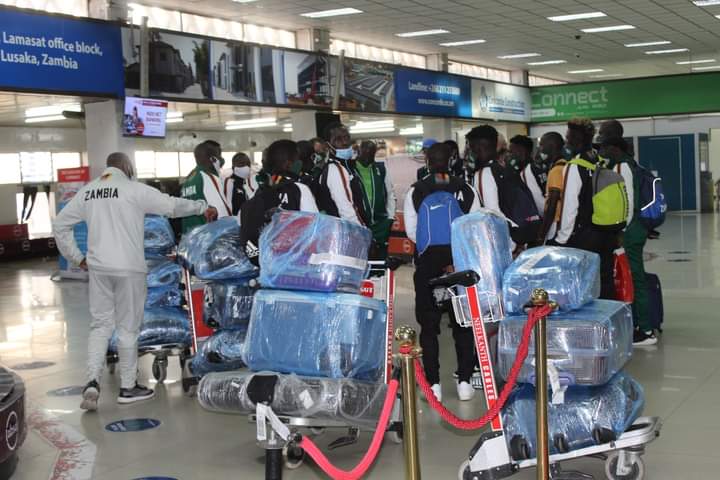African Football
Journey to Glory: The Strategic Impact of Travel Planning on African Football

In the intricate world of international football, the success of national teams hinges not only on skillful play on the pitch but also on meticulous planning and organization off it. Among the myriad factors influencing a team’s performance, the often-overlooked realm of travel arrangements emerges as a critical determinant of success. In this discourse, we delve into the multifaceted reasons why prioritizing strategic travel planning is imperative for the overall success, well-being, and professional standing of these teams.
Ensuring the welfare of players is a paramount concern for African football national teams. Prolonged and inadequately organized travels can have profound effects on both the physical and mental well-being of athletes. The importance of providing players with sufficient rest and comfort during journeys cannot be overstated. Adequate recovery and relaxation during travel are critical components in maintaining the optimal physical and mental condition of players, ultimately influencing their performance during training sessions and competitive matches.
The impact of travel on player performance extends beyond mere discomfort. Exhaustive and challenging journeys contribute to fatigue, directly affecting a player’s ability to perform at their best on the field. Consequently, well-managed travel plans become pivotal in enhancing physical readiness and maximizing the team’s chances of success in high-stakes matches. The correlation between travel conditions and on-field performance underscores the necessity for strategic planning in the realm of team travel.
Beyond the immediate impact on performance, inadequate travel arrangements pose a significant risk of injuries to players. The stress and strain associated with poorly managed journeys can contribute to physical ailments, ranging from muscular strains to more severe injuries. Therefore, meticulous planning that incorporates considerations for recovery, rest, and overall well-being is essential to minimize the likelihood of players suffering injuries related to the stresses of travel.
The journey itself plays a role in shaping the dynamics within the team. Traveling together in an organized manner fosters team bonding and cohesion. The shared experiences during transit provide players with opportunities to build relationships that extend beyond the pitch. These relationships, forged during travel, contribute significantly to positive team dynamics, which, in turn, can enhance on-field cooperation and coordination.
Efficient logistical planning is fundamental to the success of any national team. Well-organized travel arrangements encompass various facets, including timely arrivals, appropriate accommodation, and streamlined transportation. These logistical considerations collectively contribute to creating an environment conducive to focused preparation and performance. A seamless travel experience ensures that the team can devote more time and energy to strategic planning and training.
Proper travel planning is not merely about reaching the destination; it is about minimizing potential distractions. Unexpected issues during journeys can disrupt the focus of players and coaching staff. A well-orchestrated travel plan minimizes these distractions, allowing the team to concentrate fully on the upcoming matches. Such concentration is vital for maintaining peak performance levels and achieving success on the competitive stage.
The professionalism of a national team is reflected not only on the pitch but also in every aspect of its operations, including travel. Adopting and adhering to professional travel standards positively contributes to the overall image and reputation of the national team. It signifies a commitment to excellence and fosters a culture of professionalism within the team, which can have far-reaching effects on the team’s overall performance and success.
In the realm of international competitions, where teams from diverse continents vie for supremacy, travel becomes a significant factor. Teams often have to traverse long distances to participate in tournaments. Ensuring that African teams have efficient travel plans becomes imperative in meeting the rigorous standards set by international competitions. This not only facilitates the team’s participation but also positions them to compete on a level playing field with teams from other regions.
In summary, prioritizing proper traveling arrangements transcends the immediate concerns of comfort and convenience. It is a holistic approach that directly impacts player performance, team dynamics, and the overall standing of African football national teams on the global stage. By recognizing the multifaceted importance of strategic travel planning, teams can set the stage for success and well-being in their competitive endeavors.


Football Association of Zambia (FAZ)
FAZ Confirms USD 520,000 Payment to Asanovic, Debt Restructured Until 2028

National League Results
ZPL National League Round 20 Results and Updated Standings

Zambian Football News
“I Am Honored” – Samiah Phiri Reacts to First Zambia Call-Up

Zambian Football News
Copper Queens Begin WAFCON Build-Up as Nora Summons 38 Players

Zambian Football News
Sakala Fires Back at Mulenga: “You Turned Against Me Over Money”

African Football
Cameroon Eliminate South Africa From AFCON 2025 After 2–1 Win

General Football News
Manchester United Sack Ruben Amorim After 14 Months in Charge

African Football
Aubameyang Excluded as Gabon Government Reacts to AFCON Failure

Zambian Football News
Barbra Banda Calls for Adequate Preparation After Tough WAFCON 2026 Draw

Bola Yapa Zed TV
Watch Mali vs Zambia Highlights | AFCON 2025 Group A Drama

Zambian Football News
“We Played as Trained, But South Africa Outclassed Us – Chris Kaunda”

Bola Yapa Zed TV
Watch: Zambia 3-2 Sierra Leone: Extended Highlights

Bola Yapa Zed
Match Highlights: Atletico Lusaka vs Napsa Stars
Must Read
-


Bola Yapa Zed
/ 4 hours agoWanderers End Losing Run as Rangers Extend Unbeaten Streak
Rescheduled MTN Super League Week 15 and 17 fixtures delivered high drama on Wednesday...
By Chikondi -


SPONSORED
/ 1 day agoParis Saint-Germain face Newcastle, Chelsea go to Naples: biggest Champions League matches of the week
The final round of the league phase will treat fans to many hot battles...
By Chikondi -


Football Association of Zambia (FAZ)
/ 2 days agoFAZ Confirms USD 520,000 Payment to Asanovic, Debt Restructured Until 2028
FAZ Resolves Debt to Former Coach Asanovic with Initial Payment and Long-Term Restructuring Plan,...
By Chikondi -


National League Results
/ 2 days agoZPL National League Round 20 Results and Updated Standings
The ZPL National League Week 20 fixtures delivered another round of high-stakes football, with...
By Chikondi










